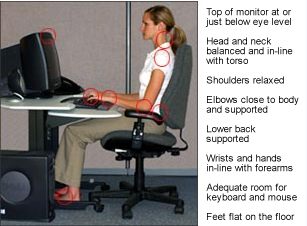Computerware Blog
Tip of The Week: Stay Comfy With An Ergonomic Workplace
Here’s a good image displaying how you should be sitting: 
By making a few simple adjustments to the way that you sit and the way your workstation is set up, you too can enjoy better overall health and workplace productivity. CNet suggests a number of ways to revamp and reconsider your workstations ergonomic situation.
Sit Down and Stay Awhile
In order to get an idea of how you want your workstation to be set up, sit down in your chair and take a deep breath. Lean back a little bit and close your eyes. You’ll find that your shoulders will relax and your hands will fall to your lap. Wouldn’t it be perfect if this was how you could work all the time? Well, you can. You just need to optimize your workstation to allow for it.
Slap That Keyboard
The next step is envisioning your ideal desk setup. In order to maximize efficiency and comfort, you want to be able to sit just like you were a moment ago, only with your hands comfortably on the keyboard and mouse. The keyboard itself should only be about one or two inches above the thighs, and close enough for your elbows to be by your sides. In order to accomplish this, you might need a keyboard tray, which also frees up more space on your desk surface for papers and other documents you might need to view.
Ideally, you want your hands about a shoulder-length apart from each other, and parallel to your thighs. Once you get this position down, all you need to work on is your wrist position. Whatever you do, do not use a wrist rest. This will lead to carpal tunnel and poor blood circulation. Arch your wrists just slightly. Do not let them lay flat against the surface of your desk, and don’t worry about the little pegs on the back of your keyboard. They’re useless.
Monitor Your Monitors
Now it’s time to adjust your monitors for your new ergonomic seating arrangement. Take your arm and extend it fully. Your middle finger should just barely be able to graze the screen. If you use two monitors, put them side-by-side at a slight angle. You should be able to pan your arm in an arc, and let your middle finger graze each of them ever so slightly.
Once that’s finished, you need to adjust the height of the monitors. They should be set so that the search bar is at eye level. You should also tilt your screens downward slightly in order to minimize glare.
Back Where It All Began
Finally, in order to wrap up your ergonomic experience, you need to make a difficult choice - ditch your old chair, or buy a better one? It depends on how much support it offers for your lower back. You want one with good lumbar support. If it has that, you’re golden. All that’s left is a bit of specification.
There should be some space between the backs of your legs and the seat of the chair - you can gauge this amount by setting your fists behind your legs. If your feet hang off the edge of the chair after all of your adjusting, don’t move it. Do yourself a favor and buy a footrest. That way, your feet won’t fall asleep or feel like jello by the end of the day.
People work best when they feel comfy. Don’t let discomfort distract you or your employees from working at their maximum capacity. Is your work setup working for you? Tell us about it in the comments.


Comments